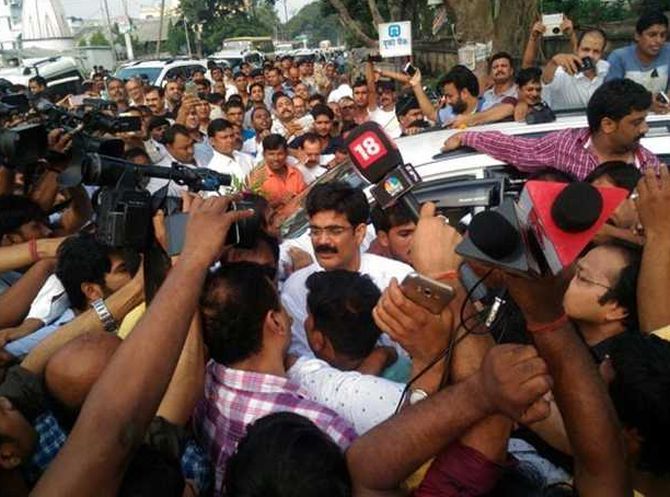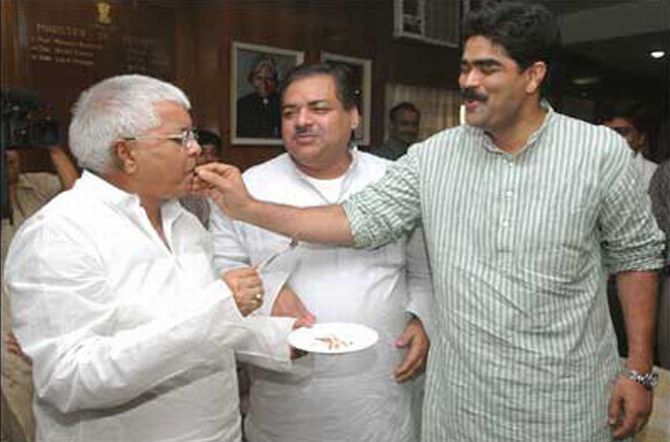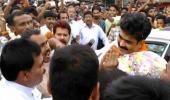Nitish Kumar had a week's time to prove his majority, but Laloo Yadav made full use of Siwan don Mohammad Shahabuddin (who died of COVID-19 on Saturday, May 1, 2021).
A revealing excerpt from Rajesh Singh's Baahubalis Of Indian Politics: From Bullet To Ballot.

Most people would be sobered up after spending time behind bars, but Mohammad Shahabuddin was far from subdued when he walked out on bail in September 2016, from a Bhagalpur jail, after being inside for over a decade.
Bihar then had a coalition government in which Nitish Kumar's Janata Dal-United and Lalu Prasad Yadav's Rashtriya Janata Dal were partners.
Hundreds of vehicles -- some reports pegged the number at over 300, while others said it was more than 1,000 -- formed a huge cavalcade that greeted the don and took him along the streets.
Cocking a snook at the chief minister, Shahabuddin said that Nitish Kumar was a chief minister of circumstance, and that Lalu Prasad Yadav was his leader.
The 'circumstantial' jibe was hurtful, echoing Lalu's oft-quoted remark that it was due to his magnanimity that Nitish Kumar was heading the coalition regime, else there was no reason why his party, which had the bigger number in the assembly, could not have had its man in the post.
Saheb (Shahabuddin) admitted that the prolonged period in prison had politically harmed him -- 'a little damage has happened'. He was possibly referring to the electoral reverse his wife Hena Shahab had suffered; she had lost to Om Prakash Yadav in the 2014 Lok Sabha polls.
Referring to senior Bharatiya Janata Party leader Sushil Kumar Modi's allegation that the RJD-JD-U alliance had paved the way for his release on bail, Shahabuddin pithily said, 'There is no need to take Sushil Modi seriously.'
But the judiciary could not be similarly brushed aside; it had to be taken very seriously.
In July 2006, a sessions judge, trying some of the cases allegedly involving Shahabuddin, was offered allurements by a lawyer considered close to the strongman.
When that didn't work, the tried and tested method of threats was put in motion.
The matter was brought to the notice of the Patna high court, which directed that charges be registered against the lawyer for the offences he had committed.
The lawyer allegedly threatened to eliminate the judge if his verdicts didn't rescue the don. The somewhat shaken but still resolute judge informed his superior, and the two then briefed a senior police officer of Siwan.
The threatened judge also informed the Patna high court through the state's advocate general. The judge and his senior had been appointed by the high court to head two special courts inside Siwan jail for speedy trial of the cases against the Saheb of the region.

Saheb's political clout was undoubtedly derived out of patronage from the highest levels. Even the senior-most police officials were thus wary of acting against him. D P Ojha was different. As director general of the Bihar police during Rabri Devi's rule as chief minister in 2003, he did the unthinkable, executing the don's pending arrest order in one of the cases of kidnapping and murder.
Chief Minister Rabri Devi was livid at not being consulted. Lalu Prasad, who was not in Patna, called up Ojha, asking him to explain the matter to Rabri Devi.
When Ojha met the CM, she looked agitated and asked thrice why she had not been not consulted. The DGP had lost his patience by then and said, 'It is the DGP or senior police officers' prerogative to decide whom to arrest.'
Ojha told Rabri Devi in clear terms that he would not seek the CM's permission in such matters even in future.
The reason for such protection was, of course, political in nature. Back in 2000, when Nitish Kumar was to arrange the numbers to let his regime survive -- he had a week's time to prove his majority -- the RJD made full use of the Siwan don.
What followed was a delectable smash-and-grab drama… It was a week that lawmakers pawned to outlaws.

While Lalu loyalist Mohammad Shahabuddin, probably the most feared and influential underworld creature of the day, held the gun, literally, to the heads of eight Congress MLAs in the musty luxury of Patna's state-owned Patliputra Hotel, Lalu, out of jail on bail, burned the phone lines to Sonia Gandhi and her political secretary Ahmed Patel.
He said: Save Bihar from being taken over by communal forces; support me, support Rabri; you people are most welcome to join the government; name your price but don't let secular forces down.
For a better part of the week, Shahabuddin prowled the Patliputra Hotel lobby, a gun bulging out from his right trouser pocket.
His reputation for shooting sharp was well-established; it was also known that the man wasn't fond of hesitating on the trigger. His factotums were watched by dozens of Lalu's own MLAs whose loyalty was suspect.
Author Arun Sinha reproduces in his book the account of a journalist (Arun Srivastava) who was at the hotel. 'I walked in and found Shahabuddin sitting relaxed in a chair dressed in a vest and lungi. He knew who I was and asked me to sit down.
'What's up?' I asked in a half-knowing, half-cajoling voice.
'Anything to stop Nitish grabbing power,' he said matter-of-factly.
I came out and hung around the place for some time and saw glimpses of the MLAs in his captivity.
Saw Ram Jatan Sinha and Jagdish Sharma (independent). Most of the Congress MLAs were tribals. Suddenly I noticed Jagdish Sharma and a few other MLAs walking down a corridor and in a flash, Shahabuddin, a cocked gun in each hand, and his gang members, rushed to stop and herd them back into their rooms.
'Don't try that again,' Shahabuddin warned them.

But while Lalu Prasad Yadav, with the help of musclemen like Shahabuddin, was busy in terminating Nitish Kumar's regime, the chief minister himself seemed to be unsure of how he must counter the effort.
Arun Srivastava relates, 'I went to the assembly where I found Nitish in his chamber. I told him what I had seen at Hotel Patliputra and asked him if he should not be asking the police chief to raid the place and free the captive MLAs.
Nitish said, "Saryu Rai (state BJP leader) is handling that part." I was astonished by Nitish's response. I think his soft approach was what pulled him down.'
The chief minister was worried about having his image tainted. 'Nitish, squeamish about employing strong arm, was prepared to dip his toe into the cesspool of realpolitik but averse to sullying his virgin kurta.
He wanted power, but not to get his hands dirty. There were many criminals who won as Independent candidates, he was told, and they were ready to lend him support.
Meet them, his camp pleaded, make them an offer and the gaddi will be yours to keep.
There was Suraj Bhan from Mokjma, Sunil Pander Piro, Dhumal of Baniapur, Rajan Tiwari, Rama Singh and Munna Shukla.
Between them, they had ticked off all the trophy violations in the Criminal Procedure Code: Murder, attempt to murder, abduction, loot, robbery, illegal confinement, intimidation, embezzlement, trespass.'
Finally, an arrangement was agreed upon. Senior BJP leader Kailashpati Mishra was tasked with connecting with the dons cooling their heels in jail. He went inside Beur Jail to solicit support with some sorts of promises.

Nitish Kumar wanted their support, but did not want to be seen with them. He sat cowering in the chief minister's chamber, in the seat that he had so long aspired for and finally achieved.
He sent word that he did not want to meet the jailbirds, not in the public eye at any rate. But the jailbirds had other ideas, and before the poor chief minister could do anything, they had barged in, and got themselves photographed with him, all the while shouting, 'Nitish Kumar zindabad!' The visual was splashed all over in the media in the following days.
However, in the end, the compromises Nitish Kumar had reluctantly made did not work; he failed to muster a majority and, seeing the writing on the wall, quit without facing a floor test.
'Rather than going down as a loser in a vote, it would be more honourable for him to submit his resignation. That would be an acceptance of defeat—with the humiliation of being outvoted.'

But the bitter fact was less about retaining honour. 'The truth was Nitish had not been outvoted but outmanoeuvred. There were no means that he did not use that Lalu had; muscle, money, inducement tactics. But Lalu just seemed to have more of everything.
Lalu's superiority could be attributed to his experience and to his attitude towards politics that was 90 per cent realpolitik and 10 per cent morality.
Nitish's attitude was just the reverse. Nitish was an amateur, having decided to use thugs to defeat Lalu's thugs in certain constituencies for the first time.
He would not know how to use people like Sunil Pandey or Suraj Bhan as Lalu did Shahabuddin. Nor would he have liked to.'
In the months to come, though, Nitish Kumar was to become more proficient in matters of political survival.
There was a time when Siwan was remembered as the birthplace of freedom fighter and independent India's first president, Rajendra Prasad. Today, mention 'Siwan' and the name that comes to mind is the notorious Mohammad Shahabuddin.
Excerpted from Baahubalis Of Indian Politics: From Bullet To Ballot by Rajesh Singh, with the kind permission of the publishers, Rupa Publications India Pvt Ltd.










 © 2025
© 2025